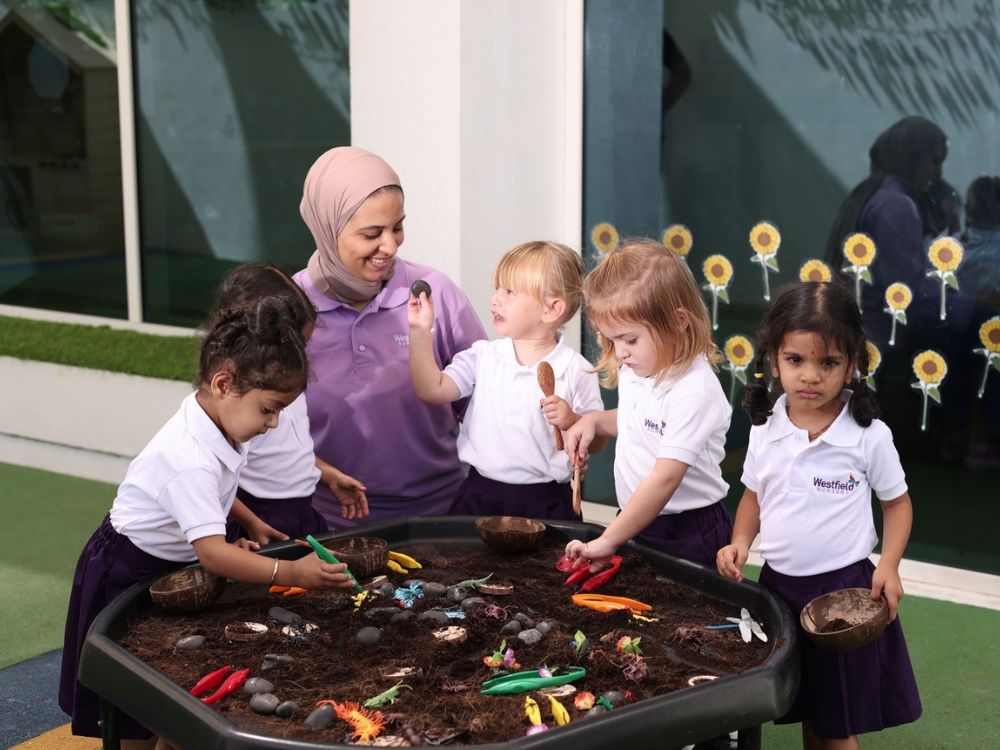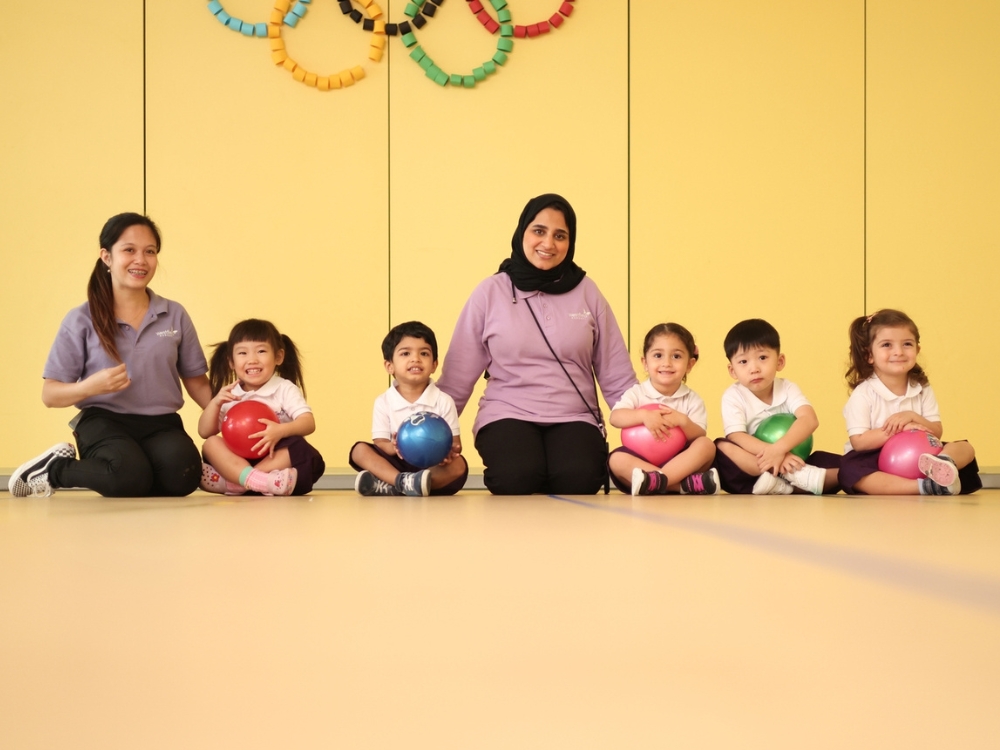EYFS British Curriculum: Meaning, Benefits & Learning Areas – Get ready for a journey into the realm of early education, where the EYFS curriculum holds sway, guiding the path of young learners toward holistic development and boundless discovery. Let’s delve deeper into the essence of the EYFS framework, unraveling its significance and exploring the myriad benefits it bestows upon children and educators alike.
Understanding the EYFS Framework
 At the heart of early childhood education in the UK lies the Early Years Foundation Stage (EYFS) curriculum—a beacon of guidance for children aged 0-5 years and their caregivers. This framework delineates the roadmap for high-quality education, encapsulating a blend of structured guidance and flexible methodology to nurture children’s growth.
At the heart of early childhood education in the UK lies the Early Years Foundation Stage (EYFS) curriculum—a beacon of guidance for children aged 0-5 years and their caregivers. This framework delineates the roadmap for high-quality education, encapsulating a blend of structured guidance and flexible methodology to nurture children’s growth.
Specific Skills Contribution
Each area encompasses unique sets of skills crucial for children’s holistic development from an early age onwards.
The 7 Areas of Learning
• The Communication and Language Area focuses on developing speaking/listening abilities.
• Physical Development covers motor skills enhancement through activities like running/jumping.
• Personal/Social/Emotional Development nurtures self-awareness/empathy/social interactions.
• Literacy involves reading/writing readiness.
• Mathematics enhances number recognition/counting abilities.
• Understanding the World introduces concepts about nature/culture/science/technology.
• Expressive Arts & Design encourages creativity/imagination through arts/crafts/music/drama.
Importance of the EYFS Curriculum
 The EYFS curriculum serves as a cornerstone in shaping the educational odyssey of young learners. By championing play-based learning, it empowers children to explore, experiment, and engage in hands-on experiences that foster creativity, problem-solving, and social interaction. Moreover, the EYFS framework advocates for a holistic approach, ensuring that every facet of a child’s development—from communication to emotional well-being—is meticulously nurtured.
The EYFS curriculum serves as a cornerstone in shaping the educational odyssey of young learners. By championing play-based learning, it empowers children to explore, experiment, and engage in hands-on experiences that foster creativity, problem-solving, and social interaction. Moreover, the EYFS framework advocates for a holistic approach, ensuring that every facet of a child’s development—from communication to emotional well-being—is meticulously nurtured.
Benefits of Implementing the EYFS Curriculum
For educators, the EYFS framework provides a roadmap for effective teaching, offering a structured yet adaptable approach to cater to diverse learning needs. Meanwhile, young learners thrive in an environment brimming with opportunities for active engagement, where play serves as a conduit for cognitive, social, and emotional growth.
Learning Areas in the EYFS Curriculum
Within the tapestry of the EYFS curriculum lie 7 key learning areas, each weaving together to form a comprehensive educational experience. From fostering communication skills to nurturing creativity and mathematical acumen, these learning domains pave the way for well-rounded development.
Principles of the EYFS Framework
 Guided by a set of core principles, the EYFS curriculum champions individuality, fosters positive relationships, and creates enabling environments that inspire curiosity and exploration. This child-centered approach lays the foundation for a nurturing educational ecosystem where every child can thrive.
Guided by a set of core principles, the EYFS curriculum champions individuality, fosters positive relationships, and creates enabling environments that inspire curiosity and exploration. This child-centered approach lays the foundation for a nurturing educational ecosystem where every child can thrive.
Characteristics of Effective Teaching and Learning in EYFS
Observing, Assessing, and Responding to Children’s Interests and Needs
Effective teaching in the Early Years Foundation Stage (EYFS) involves observing, assessing, and responding to children’s interests and needs. Teachers pay close attention to what captivates each child, tailoring activities accordingly. For example, if a child shows enthusiasm for building blocks, the teacher might incorporate more construction-based tasks into the curriculum.
In this way, children are actively engaged in their learning process by focusing on topics that interest them. This approach fosters a sense of curiosity as they explore subjects that intrigue them. By nurturing these individual interests, teachers can cultivate a love for learning early on.
Encouraging creativity is another vital aspect of effective teaching in the EYFS. Teachers create an environment where children feel free to express themselves through various mediums such as painting, music, or storytelling. Through these creative outlets, children develop critical thinking skills by experimenting with different ideas and solutions.
Assessment and Planning within EYFS
Assessment within the EYFS framework is not merely about measuring progress but about understanding each child’s unique journey. By observing, documenting, and reflecting on children’s development, educators can tailor personalized learning experiences that cater to individual strengths and areas for growth.
Legal Requirements and Parental Partnership
As a statutory requirement for early years providers in England, the EYFS framework underscores the importance of parental involvement in a child’s educational journey. By fostering strong partnerships between home and school, educators and parents can collaborate to support children’s holistic development effectively.
Preparation for Academic Success
 By fostering essential skills and attitudes from an early age, such as problem-solving abilities, creativity, critical thinking skills, and resilience among others; the EYFS British curriculum effectively prepares children for future academic achievements. These foundational skills go beyond traditional subjects and help students navigate challenges both inside and outside the classroom.
By fostering essential skills and attitudes from an early age, such as problem-solving abilities, creativity, critical thinking skills, and resilience among others; the EYFS British curriculum effectively prepares children for future academic achievements. These foundational skills go beyond traditional subjects and help students navigate challenges both inside and outside the classroom.
Through play-based learning activities embedded in the EYFS curriculum, children engage in hands-on experiences that promote exploration and experimentation. These activities not only make learning enjoyable but also enhance their problem-solving abilities by encouraging them to think creatively to overcome obstacles or find solutions to tasks presented during playtime.
An integral aspect of the EYFS British curriculum is its focus on developing positive attitudes towards learning from an early age. By instilling qualities such as curiosity, perseverance, and independence; children are equipped with a growth mindset that fosters continuous improvement throughout their educational journey.
Final Remarks
As we navigate the landscape of early childhood education, let us embrace the guiding principles of the EYFS curriculum—a beacon of hope and opportunity for young learners worldwide. By championing play-based learning, fostering positive relationships, and celebrating the uniqueness of every child, we pave the way for a future where every individual can thrive and flourish.
Frequently Asked Questions
What is the EYFS Framework about?
The Early Years Foundation Stage (EYFS) Framework sets standards for the learning, development, and care of children from birth to five years old in the UK. It aims to ensure that every child has a secure foundation for future learning.
How many Learning Areas are there in the EYFS Curriculum?
There are seven Learning Areas in the EYFS Curriculum: Communication and Language, Physical Development, Personal, Social, and Emotional Development, Literacy, Mathematics, Understanding the World, and Expressive Arts and Design.
What are the Principles of the EYFS Framework?
The principles of the EYFS Framework include unique child development pathways; positive relationships as key to enabling learning; enabling environments supporting development; observing what children can do; and valuing parents’ input into their child’s progress.
Why is Play-Based Learning important in EYFS?
Play-based learning is crucial in early childhood education as it supports children’s holistic development by enhancing creativity, problem-solving skills, social interactions, and language acquisition. It also fosters independence and self-regulation while making learning enjoyable for young learners.
How does Assessment work within EYFS?
Assessment within EYFS involves practitioners observing children regularly to understand their level of achievement across all areas of learning. This information guides planning tailored activities based on individual needs while fostering continuous improvement through monitoring progress effectively.
Imagine your child’s eyes lighting up as they climb towering castles, craft magical stories, and discover endless joy at our sun-drenched nurseries. See the EYFS curriculum come alive firsthand! Book your tour today and unlock their boundless potential: https://www.atticuseducation.ae/nurseries/
[ratemypost]





